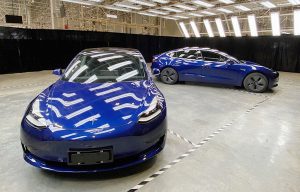
After initially extending subsidies for purchasing electric and other zero-emission vehicles to stimulate auto sales, China’s government plans to cut those incentives by 10%.
China is the world’s largest market for EVs and the government has mandated the sales of increasing of new energy vehicles, or NEVs, for some time. However, officials announced several years ago it planned on eliminating them this year.
The government has also set a new target for NEVs, requiring they account for 20% of auto sales by 2025, which is up from the current 5% of total sales. The push is designed to aid the country clear up its crushing pollution problems in its large cities.
(Tesla China sales jump as post-pandemic auto production resumes.)
The revised plan extends NEV incentives to 2022, and tax exemptions on purchases for two years, Reuters reported. They are targeted to help those at the lower end of the price segment, limited to vehicles costing less than 300,000 yuan ($42,376).
This means luxury vehicle makers, like BMW and Mercedes-Benz, are likely going to be eliminated from the rising swell of EV buyers. Additionally, the new darling of China’s EV industry, Tesla Inc., is also just outside the limit.
Tesla’s Shanghai-built Model 3 costs 323,000 yuan; however, the EV maker has a history of cutting the price of its Model 3 to make it easier for Chinese consumers to buy so it’s likely that’ll happen again. The company recently reports its China registrations jumped 450% in March from February.
(China auto production for 2020 predicted to drop 11.5%.)
The finance ministry will ease out of the subsidies, cutting them 20% next year and 30% in 2022. will in principle cut subsidies by 20% in 2021 and 30% in 2022; however, commercial NEVs will not be impacted by the subsidy cuts. They remain in effect, unchanged, Reuters reported.
“This extending of subsidies will give the industry long term support but is unlikely to impact short term sales much,” said Cui Dongshu, secretary general at China Passenger Car Association (CPCA).
Auto sales in China fell 43.4% in March in the aftermath of the coronavirus pandemic there, but that’s an improvement when compared with the nearly 80% drop in February. The total number of registrations in March was 12,709, compared with just 2,314 in February, which was the height of the coronavirus-related sales slump in China.
(China shows there may be light at the end of the pandemic tunnel for automakers.)
China’s auto companies sold 1.2 million NEVs last year, which was a drop compared with the previous year. However, they declined steadily in the second half of 2019. Battery electric and other new energy vehicles plunged 54.4% in January, just before the coronavirus began severely impacting auto sales in China, down for a seventh month in a row, China Association of Automobile Manufacturers said.







